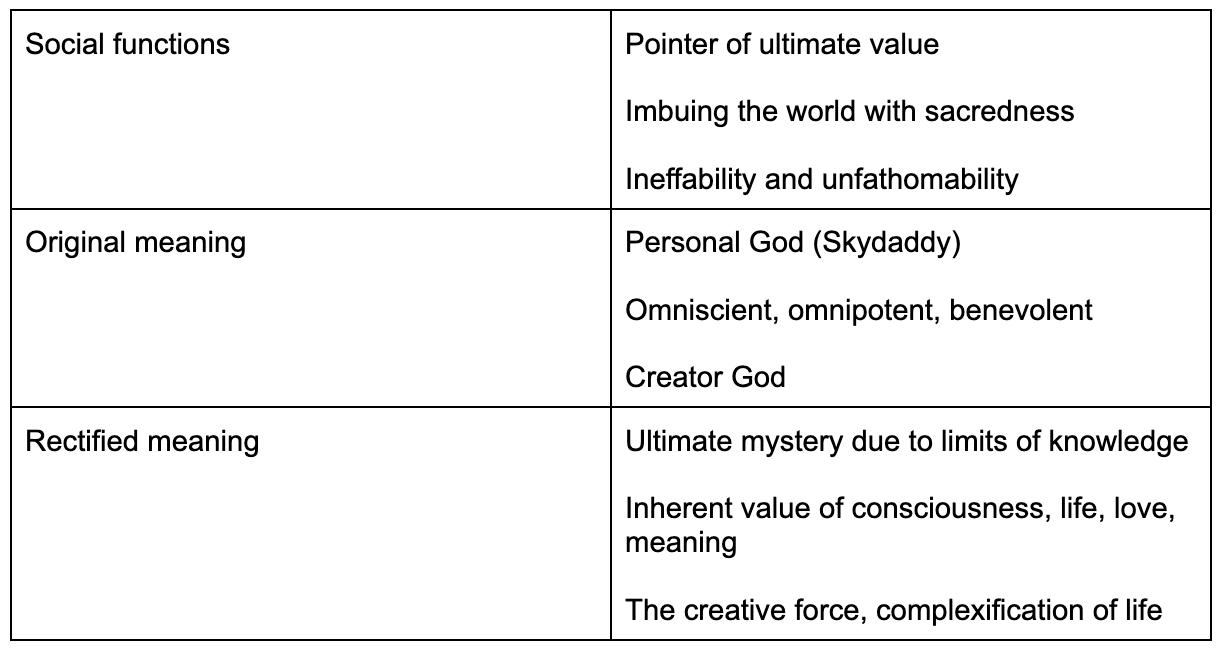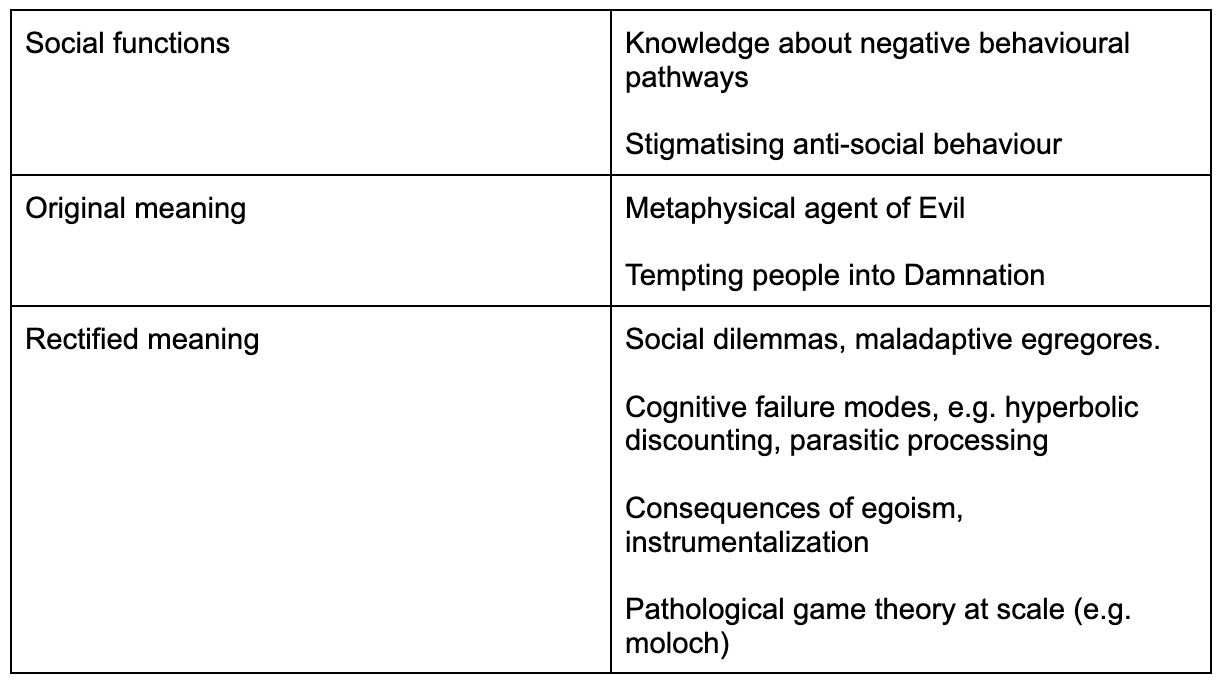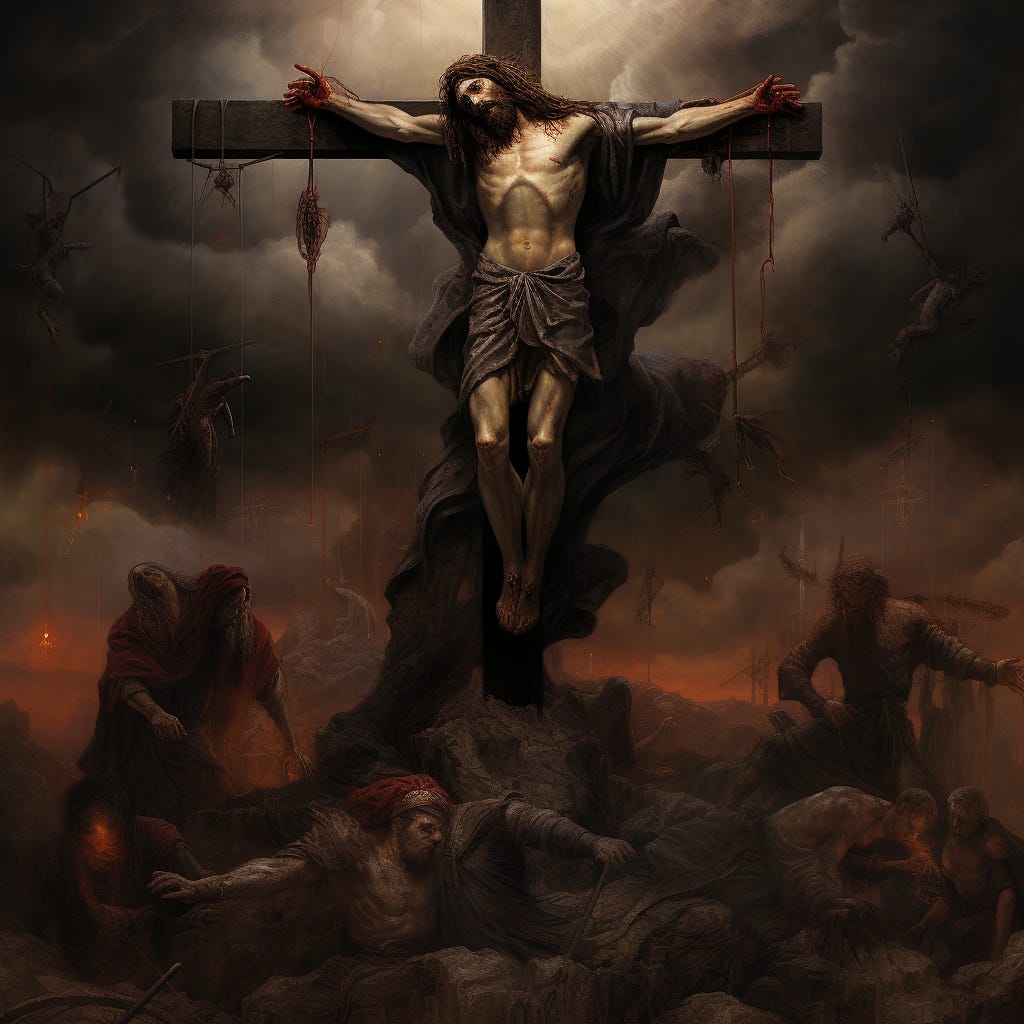Shitting on skydaddy feels so 2005. Obviously, fundamentalist beliefs and oppressive regimes that still dominate many parts of the world are problematic. However, relativist nihilism and consumerist atomization is just as problematic.
We need a new religion that can tie together society to resolve global challenges and bring personal meaning into our lives, without regressing back to a pre-modern stage of superstition and dogma. We are gunning for the personal meaning and social coherence of religion without sacrificing reason and post-structuralist insights. Potentially the easiest way to do that would be to update existing religions. It’s quite possible to come up with fully rational interpretations of most religious concepts. This would allow for “backward-compatibility”, making it easy to bring along the billions of humans still living in traditional religious frameworks. There is also a lot to be learned from traditional religions, which have been refined by social evolution for millennia.
This essay proposes a few avenues for “rectifying the names” of key Christian religious concepts. The same process could be done for other religions, of course.
New atheists didn’t get Chesterton’s fence. They missed how important religion is for social cohesion and a sense of meaning. This is ironic, given Dawkins’ work on Memetics is explicitly about the adaptive fitness of ideas. Many concepts central to traditional religions have primarily social functions, and their explanatory value is secondary. For example, there are few things more motivating to behave ethically than believing that an all-seeing God is watching your every thought and busy accounting to decide whether you’ll spend the afterlife in eternal pleasure or pain. The rotting corpse of God Nietzsche was talking about is the lack of meaning, morality, and values we experience in the atomized nihilism of late capitalism.
As much of the Western world has discarded religious views wholesale as being superstitious and outdated, we’ve thrown out valuable social technologies with the bathwater of an outdated epistème. This may contribute to the sense of isolation and meaninglessness that many who buy into the current Western paradigm lament.
There have been many attempts at creating new religions that update and unify previous interactions, from Baha’i to Perennialism to Syntheism. The challenge for these approaches is it’s hard to “design” a religion top-down - religions grow and are only formalized post-hoc, just like languages. A more promising attempt might be to tap into existing religions and redefine their key concepts in terms that align with current scientific understanding while preserving their social function. These updated concepts could be the fertiliser that allows a non-dogmatic, universal religion to grow while allowing easy switching from traditional religions.
Rectification, not just acting as if
A simple fix to rescuing religious concepts is to take them as metaphors or simply act as if they were true (e.g., Peterson explains here).
Acting “as if” can be achieved by suspending disbelief like going to a movie, or by playing with probability (after all, we can’t really know, right?) - Pascal’s Wagering it.
That’s not good enough. By cutting off reason or constantly method-acting, we’ll get half-assed social benefits at best, and not much personal transformation. The difference between someone who prays to a metaphorical Jesus and someone who actually believes that they are communing with the literal son of God, is massive. When push comes to shove, people won’t stick to religious frames if they don’t believe them deep down.
If we re-interpret the concepts to get them in line with our scientific understanding, we can actually believe in them. Often, we just need to get rid of some dogma. Sometimes, we can do slight tweaks, such as switching from actors to processes, or moving the time axis from the afterlife to this life. E.g. When Jesus talked about the Kingdom of heaven, he was talking about real life. The here and now. Other times, we can follow language back to original meanings and unearth a more fundamental meaning. It’s crucial that we ensure that the social functions of the concepts are preserved by doing this.
Rescuing key concepts
Let’s get into it then. To prevent this post from becoming an epic tome, a table per concept will do most of the work. I’ll note the major social functions of the concept and a few keywords on both the original meaning and a possible rectified meaning. I’ll unpack the rectified meaning just a little bit.
God
Many religions view God as something beyond human understanding and prohibit making images of “Him”. Going back to that removes much of the dogma (and unnecessary gender), and makes God fully believable again. “God” is the linguistic pointer pointing beyond language. What we cannot understand. The profound mystery of being, both things that we don’t yet know and stuff that we can’t ever know by definition.
God delineates the limits of our understanding. Related to that mystery, “God” also points to the ultimate value (beyond words). This has a critical social function because it protects value systems from overfitting on a specific value (which will flip them into their opposite). In that protective cloak of mystery, we can think of universal values such as consciousness, life, love, meaning, etc.
It seems key to think of God as a process instead of as an actor. God is the totality of the universe complexifying over time. The creative force that keeps bringing novelty into the world. Note that all of these aspects can quite easily be related to the Christian concept of God, the main tweaks necessary are just to drop some dogma and to shift into a process view.
The Devil / Evil
The most basic anchor for any type of morality is valence realism. Suffering is bad, as a matter of direct experience (duh). Processes that reliably create unnecessary suffering are evil, and the little voice that is driving people towards that, that’s the Devil.
Arendt’s Banality of Evil drives this point home strongly: What made the atrocities of Nazi Germany possible was not evil individuals, but evil processes. Blind submission to an ideology and abdication of personal responsibility. Any one person felt like they had no choice but to comply as a little cog in the machine (that’s what the Devil told them), it’s their aggregate actions that created monstrosities (Evil). Egoism, only looking at your own “utility function” in the present, is how the Devil gets to you. We can generalize this to any social dilemma/coordination failure, even though some are clearly more evil than others.
Evil is also possible in the relationship of an individual to itself, especially across the present vs. future self. Think of addiction. Vervaeke’s “parasitic processing” framework fits in here neatly: Any type of self-deception that leads to suffering can be thought of as evil.
Finally, the notion of instrumentalization is key here. Taking others as a means to an end, or optimizing for one narrow metric alone leads to evil. It’s what happens when we forget that God is a mystery, when we take our understanding to be complete and instrumentalize others toward whatever goal we are pursuing. It’s much easier to be evil if you don’t think there is such a thing. It makes sense to think of the Devil as a transpersonal being, an egregore. Evil, in turn, is a relational process that creates suffering, not a fixed characteristic. The Devil rises from social conditions that foster Evil.
"The greatest trick the Devil ever pulled was convincing the world he didn't exist."
Jesus
The social functions that Jesus had are non-obvious so it’s worth unpacking that. Besides the moral example, Jesus also created group cohesion through his miracle-filled story. From immaculate conception to walking on water, believing the whole story wholesale seems ludicrous from a rational point of view. In evolutionary terms, that’s called a costly signal. Buying into irrational beliefs creates a strong in-group. It’s also not a coincidence that Jesus took on all of the sins of the world and sacrificed himself. The Girardian analysis of sacrifice and scapegoating sheds light on this. Unpacking this further is out of scope but you can read more on it here.
However, accepting the miracles around Jesus opens up the door for all kinds of dogma and self-selects for irrationality. The solution is admitting that Jesus is a myth. An admittedly fictional prophet has the advantages that it can’t be attacked personally, and that the story could be adapted going forward. We can still reap the benefits of group cohesion since we can still choose to believe in a myth, even though we know it’s fictional. Its truth value lives on an allegorical level, not as an accurate historical account.
Heaven & Hell
Heaven and hell are about incentives. However, we don’t need to reach for the metaphysical mega carrot and stick that are eternal damnation or bliss. The spectrum of valence in this life should be quite enough. To reclaim the concepts of Heaven and Hell, we just need to shift the time axis to this life. Heaven is a mental state of peace and well-being; hell is anger, hatred, and disgust.
The golden rule “do to others what you would have them do to you” applies purely on a psychological level: When we treat others in a shitty way, we hurt ourselves indirectly too. Acting with malicious intent causes cognitive dissonance, repression, and a negative self-image, which will all eventually cause us to suffer one way or another. We don’t need an all-seeing God to our moral tally, at least a part of us knows exactly what we’re doing (and why) at any given time. This allows us to bring virtue ethics back into the mix to a world that is slipping towards evil by maxxing on utilitarianism (looking at you, Effective Altruists). Intent matters just as much as utilitarian calculus, for it brings about Heaven or Hell.
(Original) Sin
To reclaim the concept of sin, we can trace back its etymology. The Biblical Greek word for sin, "hamartia", originates from archery and literally refers to a missed shot. So Sin could be interpreted as “missing the mark”, as suggested by Jonathan Pageau. Falling short of the best possible action, in line with God (the most adaptive response given all of life) and moving us closer to Heaven (maximum long-term positive valence for all beings).
What we want to discard are the guilty vibes commonly associated with Sin. We are all sinners a.k.a. nobody is perfect. As a recognition that we can never reach perfection, it should counteract a sense of guilt and inadequacy and protect us from reifying impossible ideals of perfection (which always backfire).
We can also relate Sin to Evil. In this sense, sinning is taking the map for the territory or relating to others in an instrumentalizing way. Original sin could be seen as the tendency inherent in language itself to split up the world into objects and to confuse signifiers with signified.
Let’s not do the Apocalypse thing any longer
This doesn’t mean that we have to rescue the whole of Christian faith. Even though the tweaks suggested here would make it easy for Chritians to transition into an updated belief system in line with scientific understanding, it’s unrealistic that major Christian denominations would officially endorse it. So might as well get rid of some of the baggage. There are many issues that come to mind related to power relationships, especially in Catholicism (e.g. infallibility of the Church and its representatives). But there is one concept in particular that I’d suggest not to rescue: The Apocalypse.
The following aspects seem inherently problematic with the concept:
Posits an ultimate culmination point of history, narrowing people into an outlook of inevitability and short-term thinking (which fuels means-to-and-end thinking)
Generates end-times vibes that could hyperstition catastrophes (remember, we still have 10k+ active nuclear warheads floating around)
Generally posits that a “chosen group” will be saved while all others perish
Apocalyptic thinking is probably the most successful export from Christianity in other ideologies: From Marxism (Communism as the inevitable endpoint of history) to Singularitarianism (AGI as the Apocalypse), the script of the Apocalypse is running rampant to this day. Jamie Wheal and others have discussed this prevalence of “rapture ideologies” in their work. It may be best to just rip out that script altogether.
The future is inherently unknowable, there are no chosen people. We’re in this together.

















Ilia Dialo comes to a similar conclusion in "The Not Yet God."
"The whole field of experience is the divine milieu. Nothing is profane for those who are able to see.... God is being born from within."
proper interesting article this nice one octopus